|
|
|
Sort Order |
|
|
|
Items / Page
|
|
|
|
|
|
|
| Srl | Item |
| 1 |
ID:
112472
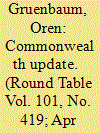

|
|
|
|
|
| Publication |
2012.
|
| Summary/Abstract |
There were clashes between protesters and the police after Mohamed Nasheed was replaced as president of the Maldives by his deputy, Mohammed Waheed Hassan, in what Nasheed said was a coup. A film aimed at raising awareness of the atrocities committed by Joseph Kony, leader of the notorious Lord's Resistance Army militia in Uganda, became an internet phenomenon, being seen by close to 100 million people in a month, but also drew fierce criticism. The Boko Haram Islamist uprising in Nigeria claimed hundreds more lives with the rebels rejecting offers to negotiate. Australia's prime minister, Julia Gillard, defeated a challenge to her leadership by her foreign minister, Kevin Rudd. Fears grew for the nascent democracy in Malawi as a prominent human rights lawyer and critic of President Bingu wa Mutharika was jailed. The king of Tonga, who introduced democracy to the south Pacific nation, died.
|
|
|
|
|
|
|
|
|
|
|
|
|
|
|
|
| 2 |
ID:
112474
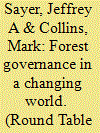

|
|
|
|
|
| Publication |
2012.
|
| Summary/Abstract |
There has been intense international debate on the governance of forests, in particular tropical forests. This has been driven by contrasting pressures from conservation and human rights groups, respectively calling for global values to prevail so as to protect biodiversity and reduce climate change, or for freedom of choice that empowers local people with the right to manage their own forests. Both sides have condemned irresponsible behaviour by forest officials and political actors, and highlighted the harmful impacts of disregard for the law. However, these normative approaches to forest governance have coincided with a fundamental re-examination of the objectives that societies have for their forest resources. The debate is not only about legality, but also about the legitimacy of forest laws and institutions. This review explores the divergence of views on long-term goals for forests and the implications for their governance. It emphasises that the real challenge is to reconcile the management of forests for values that accrue at different spatial and temporal scales. Forest governance needs to adapt, moving away from a framework based upon the neatly defined boundaries beloved of international organisations and treaties, and submitting to a constant process of adaptation and improvisation at a more local scale. The challenge is to find ways to aggregate such approaches into something that recognisably addresses the global values of forests and forest landscapes. Commonwealth countries have a wide range of forest conditions and are innovating with a range of governance options that provide lessons of potentially wide application.
|
|
|
|
|
|
|
|
|
|
|
|
|
|
|
|
| 3 |
ID:
112475
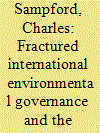

|
|
|
|
|
| Publication |
2012.
|
| Summary/Abstract |
This paper begins by examining the reasons behind most failures of governance, including fault lines in institutional and professional specialisation, and in ideology. These three, forever competing within and between themselves, frustrate attempts to find solutions to some of the world's most pressing challenges. Not least among these are environmental challenges, where preferences and priorities that are geographically, professionally or ideologically narrow inevitably fail to achieve solutions for the greater good. What role can the Commonwealth play in addressing the fracture lines that bedevil solutions for climate change and biodiversity? It may help to stimulate global action on these issues if it can encourage agreement across multidimensional global boundaries. We know the Commonwealth is not a leading global force for controlling climate change or biodiversity loss; but if it had the political will it could be an exemplar of how, between a group of vastly diverse countries across the globe-and on the global political stage-binding agreement and positive action on climate change and biodiversity could be promoted and perhaps achieved. One of the strongest features of the Commonwealth is the generation of long-standing legal and ethical norms whose appeal is obvious even if their implementation is lacking. These norms should not be limited to the rule of law, democracy and human rights, but should include environmental norms because these too are fundamental to a satisfactory human condition.
|
|
|
|
|
|
|
|
|
|
|
|
|
|
|
|
| 4 |
ID:
112473
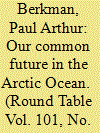

|
|
|
|
|
| Publication |
2012.
|
| Summary/Abstract |
Environmental state-change in the Arctic Ocean is introducing risks of political, economic and cultural instability. Interests are awakening to take advantage of new energy, shipping, fishing and tourism opportunities associated with the diminishing sea-ice. With urgency-building on the common arctic issues of sustainable development and environmental protection-environmental security offers an holistic context to address the risks and opportunities within law of the sea, as the international legal framework to preserve peace and stability in the Arctic Ocean.
|
|
|
|
|
|
|
|
|
|
|
|
|
|
|
|
| 5 |
ID:
112477
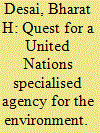

|
|
|
|
|
| Publication |
2012.
|
| Summary/Abstract |
Recent years have seen intense intergovernmental deliberations on issues concerning governance in the field of environment. Their aim has been to address the role of the institutions that provide platforms for international environmental cooperation. There are two main lines of enquiry: the role of regime-specific institutions that cater to sectoral regulatory frameworks (popularly known as multilateral environmental agreements, or MEAs); and the role of institutions that are established to follow up on global environmental conferences or a specific environmental task. Most of these institutions reflect intergovernmental consensual process. However, there are concerns about their proliferation and there is a growing cacophony of calls to 'bring coherence to the fragmented landscape of MEAs, intergovernmental bodies, UN system entities and other international organizations' (Sha Zukang (2011) 'Legal and policy dimensions of sustainable development: expected contribution of Rio + 20', Environmental Policy and Law, 41(6), pp. 244-246, at p. 245). In fact the need to bring order to environmental governance has assumed great importance and urgency if environmental cooperation is to be achieved. This paper explores, in particular, the role of the United Nations Environment Programme and its potential for conversion to a specialised agency of the UN.
|
|
|
|
|
|
|
|
|
|
|
|
|
|
|
|
| 6 |
ID:
112476


|
|
|
|
|
| Publication |
2012.
|
| Summary/Abstract |
Seas, oceans and fisheries are probably among the most challenging natural resource systems to govern. This contribution discusses why this is so by analysing the key issues and presenting a selection of approaches to tackle them. The main recommendations are for control of illegal and open access fisheries, reduction of perverse subsidies, establishment of more marine protected areas, and proper evaluation of the importance of fisheries to future generations. Only then can fisheries be managed sustainably. The paper uses fish and fisheries in the Commonwealth of Nations to illustrate the points being made.
|
|
|
|
|
|
|
|
|
|
|
|
|
|
|
|
|
|
|
|
|